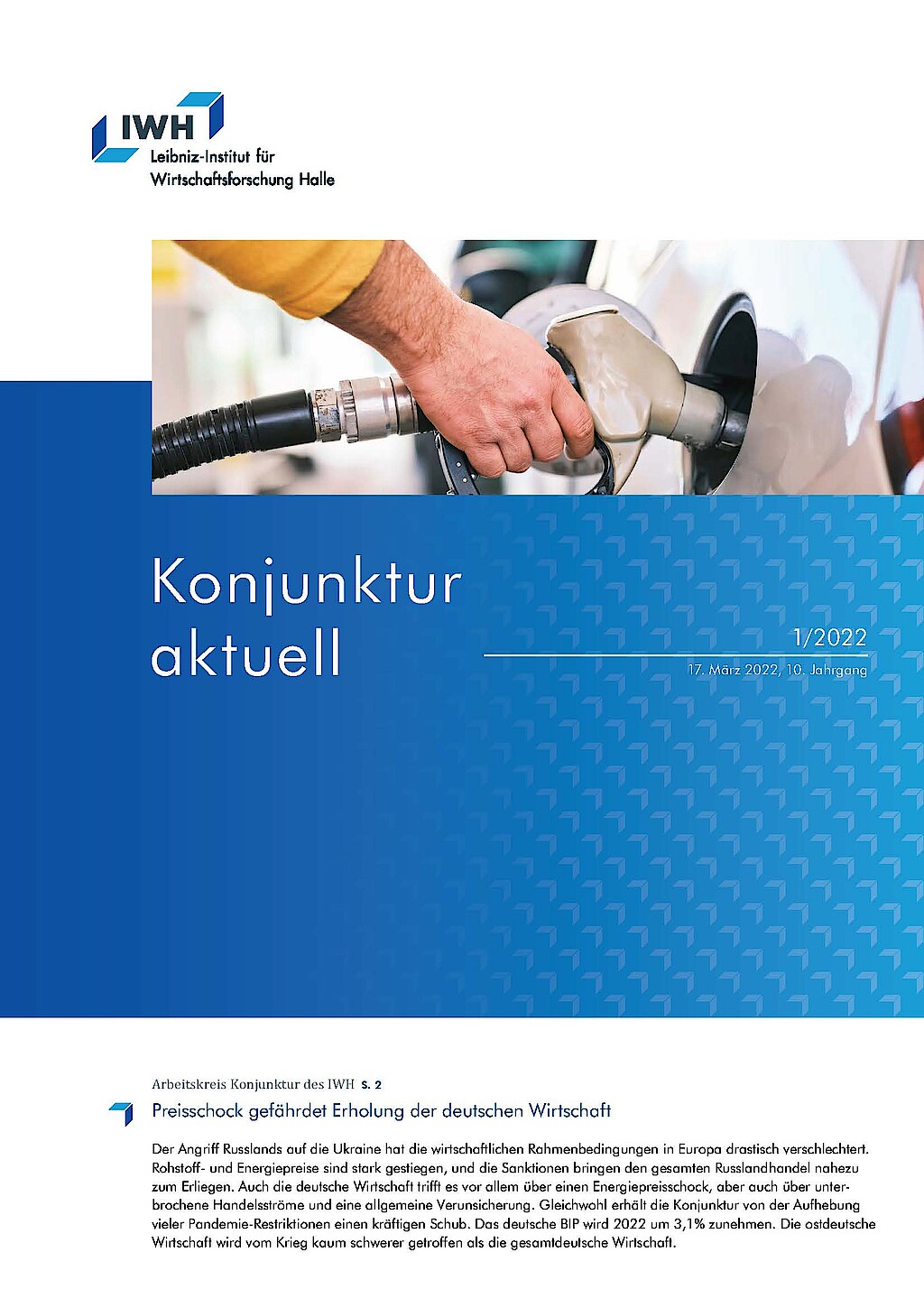Price shock jeopardises recovery of German economy

Russia’s attack on Ukraine has drastically worsened economic conditions in Europe. Prices for raw materials and energy, and here especially for natural gas, have risen sharply, the sanctions are bringing trade with Russia that goes beyond energy supplies to a virtual standstill, and European share prices have fallen significantly in value. In the event of a halt to Russian supplies, gas would have to be rationed in Germany, and a sharp recession, especially in the manufacturing sector, was to be expected. If, as assumed here, the gas flow continues, the main economic effect of the crisis will be the rise in energy prices, leading to real income losses for private households and a loss of competitiveness for firms, especially because natural gas is particularly expensive in Europe. Value chains that led through Ukraine or Russia are also being torn apart. Inflationary pressures, which were already high in most regions of the world before the start of the war, will intensify further. In the US, monetary policy is turning less expansive which entails the risk of an economic downturn in the country itself, but also worldwide.
The war is hitting the German economy in a recovery phase, after the winter wave of the pandemic caused private consumption and economic activity to decline in the final quarter of 2021. “The pandemic is by no means over, but with the lifting of many restrictions imposed to combat the pandemic in March, the recovery is likely to gain momentum,” says Oliver Holtemöller, head of the Department Macroeconomics and vice president at the IWH. This is because private households are likely to spend some of the savings they accumulated during the pandemic in the coming quarters, which will benefit service providers in particular. Production is therefore likely to expand quite strongly in the second quarter. However, consumers will have to use part of the money to meet the higher cost of living, as the Russian war will further increase the already strong price momentum in Germany. “Inflation, shortfalls in exports to Eastern Europe, and general uncertainty are channels through which the war is dampening the German economy, and consequently, rates of output growth will go down significantly in the second half of the year,” Holtemöller says. The build-up in employment slows in the course of 2022, coming to a virtual standstill towards the end of the year due to the sharp increase in the minimum wage. High energy and raw material prices cause the German current account balance to fall sharply from 6.9% as a share of GDP in 2021 to 5.4% in 2022. The budget deficit is expected to decline significantly in the current year, as social security revenues are expected to expand at an accelerated pace as the economy picks up, while public spending is unlikely to rise much because the costs of the Corona pandemic will be declining.
The extended version of the forecast (Konjunktur aktuell: Konjunktur aktuell: Price shock jeopardises recovery of German economy) contains the following four boxes (all in German):
Box 1: The Russian economy is structurally weak
Box 2: Assumptions for the forecast
Box 3: Estimation of potential output
Box 4: Forecasting greenhouse gas emissions
Publication: Drygalla, Andrej; Exß, Franziska; Heinisch, Katja; Holtemöller, Oliver; Kämpfe, Martina; Kozyrev, Boris; Lindner, Axel; Müller, Isabella; Sardone, Alessandro; Schultz, Birgit; Staffa, Ruben; Zeddies, Götz: Preisschock gefährdet Erholung der deutschen Wirtschaft. IWH, Konjunktur aktuell, Jg. 10 (1), 2022. Halle (Saale) 2021.
Whom to contact
For Researchers

Vice President Department Head
If you have any further questions please contact me.
+49 345 7753-800 Request per E-MailFor Journalists

Internal and External Communications
If you have any further questions please contact me.
+49 345 7753-832 Request per E-MailIWH list of experts
The IWH list of experts provides an overview of IWH research topics and the researchers and scientists in these areas. The relevant experts for the topics listed there can be reached for questions as usual through the IWH Press Office.
Related Publications

Konjunktur aktuell: Preisschock gefährdet Erholung der deutschen Wirtschaft
in: Konjunktur aktuell, 1, 2022
Abstract
Der Angriff Russlands auf die Ukraine hat die wirtschaftlichen Rahmenbedingungen in Europa drastisch verschlechtert. Rohstoff- und Energiepreise sind stark gestiegen, und die Sanktionen bringen den gesamten Russlandhandel nahezu zum Erliegen. Auch die deutsche Wirtschaft trifft es vor allem über einen Energiepreisschock, aber auch über unterbrochene Handelsströme und eine allgemeine Verunsicherung. Gleichwohl erhält die Konjunktur von der Aufhebung vieler Pandemie-Restriktionen einen kräftigen Schub. Das deutsche BIP wird 2022 um 3,1% zunehmen. Die ostdeutsche Wirtschaft wird vom Krieg kaum schwerer getroffen als die gesamtdeutsche Wirtschaft.



